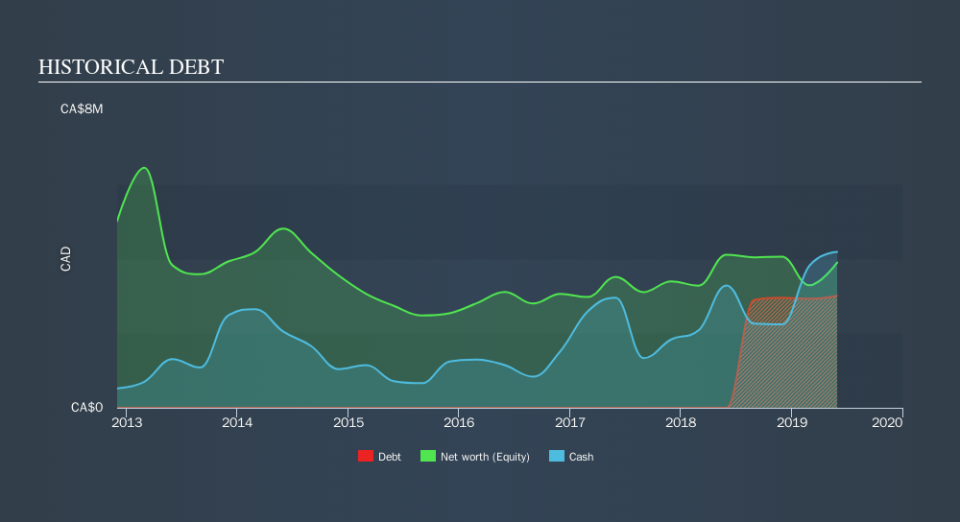Is Thermal Energy International (CVE:TMG) Using Debt Sensibly?

Legendary fund manager Li Lu (who Charlie Munger backed) once said, 'The biggest investment risk is not the volatility of prices, but whether you will suffer a permanent loss of capital. When we think about how risky a company is, we always like to look at its use of debt, since debt overload can lead to ruin. We can see that Thermal Energy International Inc. (CVE:TMG) does use debt in its business. But the real question is whether this debt is making the company risky.
When Is Debt A Problem?
Debt and other liabilities become risky for a business when it cannot easily fulfill those obligations, either with free cash flow or by raising capital at an attractive price. If things get really bad, the lenders can take control of the business. While that is not too common, we often do see indebted companies permanently diluting shareholders because lenders force them to raise capital at a distressed price. Of course, debt can be an important tool in businesses, particularly capital heavy businesses. When we think about a company's use of debt, we first look at cash and debt together.
See our latest analysis for Thermal Energy International
What Is Thermal Energy International's Net Debt?
The image below, which you can click on for greater detail, shows that at May 2019 Thermal Energy International had debt of CA$3.01m, up from none in one year. However, its balance sheet shows it holds CA$4.18m in cash, so it actually has CA$1.17m net cash.
A Look At Thermal Energy International's Liabilities
Zooming in on the latest balance sheet data, we can see that Thermal Energy International had liabilities of CA$5.96m due within 12 months and liabilities of CA$3.19m due beyond that. Offsetting this, it had CA$4.18m in cash and CA$2.85m in receivables that were due within 12 months. So its liabilities total CA$2.12m more than the combination of its cash and short-term receivables.
This deficit isn't so bad because Thermal Energy International is worth CA$9.71m, and thus could probably raise enough capital to shore up its balance sheet, if the need arose. But it's clear that we should definitely closely examine whether it can manage its debt without dilution. While it does have liabilities worth noting, Thermal Energy International also has more cash than debt, so we're pretty confident it can manage its debt safely. The balance sheet is clearly the area to focus on when you are analysing debt. But you can't view debt in total isolation; since Thermal Energy International will need earnings to service that debt. So when considering debt, it's definitely worth looking at the earnings trend. Click here for an interactive snapshot.
In the last year Thermal Energy International wasn't profitable at an EBIT level, but managed to grow its revenue by21%, to CA$21m. Shareholders probably have their fingers crossed that it can grow its way to profits.
So How Risky Is Thermal Energy International?
While Thermal Energy International lost money on an earnings before interest and tax (EBIT) level, it actually generated positive free cash flow CA$497k. So taking that on face value, and considering the net cash situation, we don't think that the stock is too risky in the near term. One positive is that Thermal Energy International is growing revenue apace, which makes it easier to sell a growth story and raise capital if need be. But we still think it's somewhat risky. When I consider a company to be a bit risky, I think it is responsible to check out whether insiders have been reporting any share sales. Luckily, you can click here ito see our graphic depicting Thermal Energy International insider transactions.
Of course, if you're the type of investor who prefers buying stocks without the burden of debt, then don't hesitate to discover our exclusive list of net cash growth stocks, today.
We aim to bring you long-term focused research analysis driven by fundamental data. Note that our analysis may not factor in the latest price-sensitive company announcements or qualitative material.
If you spot an error that warrants correction, please contact the editor at editorial-team@simplywallst.com. This article by Simply Wall St is general in nature. It does not constitute a recommendation to buy or sell any stock, and does not take account of your objectives, or your financial situation. Simply Wall St has no position in the stocks mentioned. Thank you for reading.

 Yahoo Finance
Yahoo Finance 
